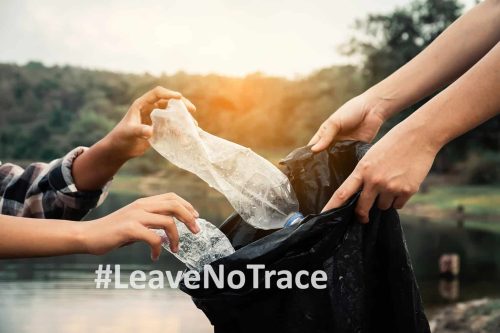Most of us are active recyclers and look for environmentally friendly products in our everyday life. But when it comes to rafting, how can we adopt a Leave No Trace attitude on multi day river trips. Trips that put us out of our regular schedule and into territory that can directly impact the environment. How can we as individuals make a multi day river adventure, with camping under the stars and sharing stories over a campfire, an environmentally friendly one?

This is where the Leave No Trace Seven Principles can help. The seven principles were created to educate campers and protect the environment. As rafters we can use them as guides to help us stay environmentally friendly on multi day raft trips.
The principles are frameworks for ensuring minimum impact rather than removal of fun or engagement with nature. Most of the principles are not new. In fact they are all pretty much common sense but when applied into a multi day rafting trip, can assist in ensuring a fun and environmentally friendly trip can be enjoyed for those on the trip and those yet to enjoy the trip in the future.
The Seven Leave No Trace Principles:
Plan ahead and prepare: sounds simple but we don’t always do it. Think about weather, access and logistics. What can you minimise, what can be left behind, what can you share with a friend; are there low impact alternatives to anything you’ll be using on the trip?
Travel and camp on durable surfaces: the best campsites are found, not made. Stick to areas that are already established for setting up camp, and avoid altering existing campsites.
Dispose of waste properly: consider the impacts of anything left behind, which will undoubtedly affect other people, water and wildlife. Take out what you bring in. In most locations, burying human faeces in the correct manner is the most effective method. Solid human waste must be packed out from some places, such as narrow river canyons. Read more on the Leave No Trace website.
Leave what you find: Leave areas as you found them. If you clear an area of surface rocks, twigs or pine cones replace these items before leaving. Leave plants and flowers as you find them – sketch or take photos as your reminders. Natural environments can only stay natural if we leave them natural.
Minimize campfire impacts: to minimise damage, light fires only where permitted, in fire rings and mounds, and keep fires small. Make sure to burn wood all the way to ash and scatter cool ashes.
Respect wildlife: don’t approach or follow wildlife. Watch animals from a distance and don’t any of them. Dog is man’s best friend – but not wild animal’s best friend. If you can’t guarantee to control your dog, it’s best to leave them at home.
Be considerate of other visitors: unless you’re on a first descent, it’s likely you will encounter other visitors to the area or travel in similar areas. Respect other people’s space and be sure not to encroach on other people’s trips. If possible, travel in the off or low season.
If you’re wondering what you can do to make your next rafting trip more sustainable, have a look at our practical guide to sustainability for rafters.



